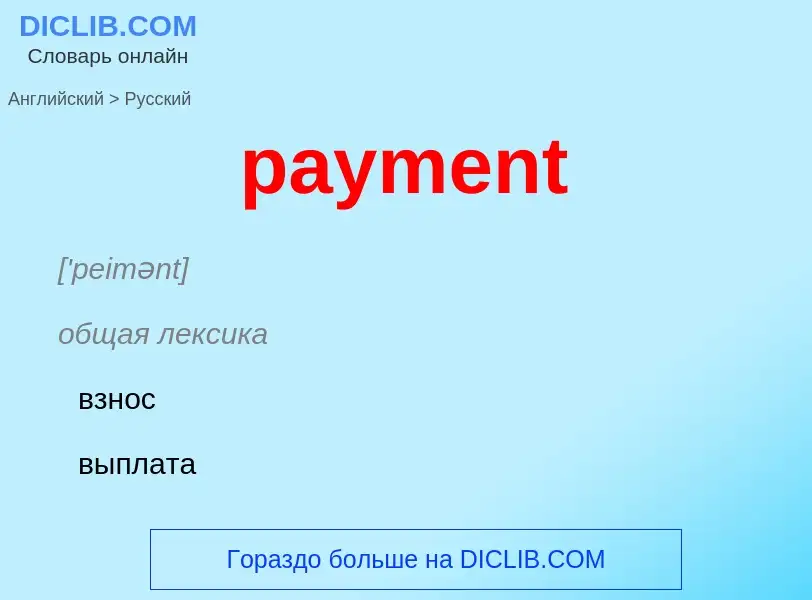Перевод и анализ слов искусственным интеллектом ChatGPT
На этой странице Вы можете получить подробный анализ слова или словосочетания, произведенный с помощью лучшей на сегодняшний день технологии искусственного интеллекта:
- как употребляется слово
- частота употребления
- используется оно чаще в устной или письменной речи
- варианты перевода слова
- примеры употребления (несколько фраз с переводом)
- этимология
payment - перевод на Английский
['peimənt]
общая лексика
взнос
выплата
оплата
платеж
платежный
строительное дело
платёж
Смотрите также
существительное
общая лексика
платёж
плата
вознаграждение
уплата, платеж, плата
взнос
экономика
оплата
платеж
погашение (долга, векселя и т. п.)
выплата
уплата (происходящая в любой форме передача средств)
устаревшее выражение
воздаяние
возмездие
наказание
расплата
синоним
Смотрите также
Определение
Википедия
A payment is the voluntary tender of money or its equivalent or of things of value by one party (such as a person or company) to another in exchange for goods or services provided by them or to fulfill a legal obligation. The party making the payment is commonly called the payer, while the payee is the party receiving the payment.
Payments can be effected in a number of ways, for example:
- the use of money, cheque, or debit, credit, or bank transfers, whether through mobile payment or otherwise
- the transfer of anything of value, such as stock, or using barter, or personal data, the exchange of one good or service for another.
In general, payees are at liberty to determine what method of payment they will accept; though normally laws require the payer to accept the country's legal tender up to a prescribed limit. Payment is most commonly effected in the local currency of the payee unless the parties agree otherwise. Payment in another currency involves an additional foreign exchange transaction. The payee may compromise on a debt, i.e., accept part payment in full settlement of a debtor's obligation, or may offer a discount, E.G: For payment in cash, or for prompt payment, etc. On the other hand, the payee may impose a surcharge, for example, as a late payment fee, or for use of a certain credit card, etc.
Payments are frequently preceded by an invoice or bill, which follows the supply of goods or services, but in some industries (such as travel and hotels) it is not uncommon for pre-payments to be required before the service is performed or provided. In some industries, a deposit may be required before services are performed, which acts as a part pre-payment or as security to the service provider. In some cases, progress payments are made in advance, and in some cases part payments are accepted, which do not extinguish the payer’s legal obligations. The acceptance of a payment by the payee extinguishes a debt or other obligation. A creditor cannot unreasonably refuse to accept a payment, but payment can be refused in some circumstances, for example, on a Sunday or outside banking hours. A payee is usually obligated to acknowledge payment by producing a receipt to the payer. A receipt may be an endorsement on an account as "paid in full". The giving of a guarantee or other security for a debt does not constitute a payment.

